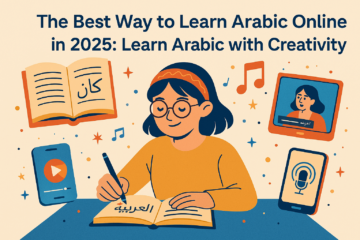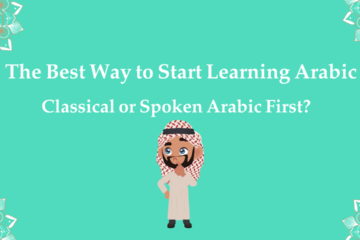Learning Arabic Online: The Two Best Online Methods

Learning Arabic Online Though The Traditional Method
The conventional method for acquiring proficiency in the Arabic language is widely followed by many students, including those studying at top universities like SOAS and Oxford, as well as Arabic tutors who advocate for this approach. The reason for this preference is that they believe Modern Standard Arabic is the most effective way to learn Arabic. Moreover, most Arabic tutors are only trained to teach Modern Standard Arabic, while classical Arabic is the predominant language used in books.
Most of the best universities rely on textbooks like Al-Kitab,1,2,3, which are primarily designed to teach Modern Standard Arabic. By adopting this method, learners can achieve proficiency in reading and writing Arabic, comprehend its grammar, read modern Arabic literature, and understand news published in outlets such as BBC Arabic.
Learning classical Arabic comes with its drawbacks. It is a highly complex language with intricate grammar, making it a challenging task to master. It typically takes students anywhere from three to five years to speak it moderately. Even after this lengthy period of learning, when students visit Arab countries like Lebanon, Syria, or Dubai, they may struggle to comprehend native Arabic speakers. If students attempt to speak classical Arabic, locals may find it unusual and they see them as the Shakespeare of the Arab world, it’s a good title to have on the other hand.
Finally, it is very difficult to build a strong relationship in the middle east as people will see a foreigner who speaks a language that is only read and used in classic books and fairy tales.
Learning Arabic Online From Fusha to Spoken Arabic
Students often realize that the knowledge they gained at university or school is more suited for reading and comprehending Arabic newspapers and books rather than conversing in Arabic. As a result, they choose to learn spoken Arabic, such as Gulf Arabic, Levantine Arabic, or Egyptian Arabic. However, transitioning from fusha to spoken Arabic can be challenging for them, as they have spent years learning fusha, and now they need to shift their focus to speaking Arabic, which can cause confusion between the two languages initially. I have noticed that most students who followed the traditional learning method struggled to differentiate between fusha and spoken Arabic. But with a few months of concentrated effort, they were able to gain a clear understanding of the two languages, which is essential to master the Arabic dialect.
Learning Arabic Online Using The Natural Method From Spoken to Classical Arabic
The second approach to learning Arabic is through the Natural method, where students opt for one of the primarily spoken dialects in the Middle East, such as Levantine Arabic, Gulf Arabic, or Egyptian Arabic. As they gain confidence in conversing with native speakers in Arabic, they can gradually transition to learning Modern Standard Arabic. This approach is the most natural way to learn Arabic and allows students to pick up the language fast.
Why is This Method to Learn Arabic is Most Natural Way to Learn Arabic?
To begin with, you must be curious as to why I referred to this method as the natural approach. Allow me to explain. As a child growing up in the Middle East, I, like every other Arab child, learned my native dialect from my family and surroundings. Later, when I began attending school, I was introduced to Classical Arabic (MSA). The books used in Arabic schools are written in Classical Arabic, which helped me learn the language passively. Additionally, our teachers taught us Classical Arabic and literature. In Syria, we were required to study Classical Arabic and Arabic literature until we graduated from university, which provided us with a solid grasp of both spoken and Classical languages. It’s worth noting that our teachers never used Classical Arabic to explain complex subjects like math or physics. Instead, they used Levantine Arabic to communicate their ideas.
The Benefits of Learning Arabic with The Second Method
Learning Arabic Online through the natural method has many benefits. One of the main advantages is that students can start speaking Arabic within six months. This early focus on speaking creates confidence and motivation to continue learning and progress to higher levels. Additionally, spoken Arabic is a simplified version of Classical Arabic, making it easier to learn with less grammar and the language itself is poetic and beautiful, especially if you choose to learn Levantine Arabic.
When you communicate in the spoken Arabic dialect with native speakers, it creates an immediate connection and understanding of their culture, making them treat you as one of their own rather than an outsider. Finally, switching from Spoken Arabic to Classical Arabic is much easier and less confusing than Than moving from Classical Arabic to Spoken Arabic.
The Biggest Challenge that Learner face when Leaning Arabic
Learning Arabic has always been a challenging task for students around the world. The complexity of the language, coupled with the traditional approach to learning, has often left students frustrated and demotivated. The traditional approach to learning Arabic typically involves focusing on grammar rules, vocabulary, and syntax, with little emphasis on spoken Arabic. However, this approach has a significant disadvantage – students often stop learning Arabic because they find it too frustrating to spend years following this approach and not be able to speak the language fluently.
As an experienced Arabic language tutor, I have witnessed countless scenarios where students have contacted me after they stopped learning Arabic. They all shared the same story – they had been following the traditional approach to learning Arabic for years, but they were unable to speak the language fluently. This frustration often leads to students giving up on learning Arabic altogether, which is a huge loss for both the students and the Arabic-speaking world.
The traditional approach to learning Arabic has its merits, but it is not the most effective way to learn the language. The focus on grammar rules and syntax can be overwhelming for students who are just starting to learn Arabic. Many students find it difficult to memorize the vast array of Arabic vocabulary, which can be discouraging. Moreover, the traditional approach often does not provide students with enough practice in speaking Arabic. As a result, students are unable to communicate effectively in Arabic, which is the ultimate goal of learning any language.
How to overcome The Challenge and Master the Arabic Language Naturally and Effortlessly
To overcome this challenge, I recommend that students focus on learning spoken Arabic such as Levant Arabic or Gulf, and then move on to Modern Standard Arabic. This approach allows students to learn the language in a more natural way, by focusing on the practical aspects of the language first. Students can start by learning the most commonly used phrases and expressions in spoken Arabic and gradually, they can develop their communication skills in Arabic and gain the confidence they need to continue learning the language.
Nassra Arabic Method – Our Fluent in Six Months Online Arabic Program
Omar and I have been using the Natural approach to teaching Arabic for 20 years now. We firmly & strongly believe that going from Learning Spoken Arabic to Classical is the most effective, efficient, and natural way to learn Arabic.
That’s why we have incorporated this approach into our online program, which is backed by a tried and tested method that guarantees fluency in Levantine Arabic and a seamless transition to Modern Standard Arabic.
You will be able to speak Levantine Arabic with confidence and read newspapers, Arabic novels, and more.
Our focus is on building your confidence so that you can effectively communicate in Arabic with ease. We understand that learning a new language can be challenging, but with our innovative approach, we make it easy and fun.
Our program utilizes a variety of techniques and strategies that cater to different learning styles. Whether you are a visual learner, auditory learner, kinaesthetic learner, or prefer reading and writing, we have tailored our program to meet your unique needs. Our interactive and structured courses ensure that you are progressing at a consistent rate.
One of the key techniques we use in our program is storytelling. We know that stories are powerful tools that can teach, entertain, stir emotions, evoke memories, and help you master the Arabic language. By incorporating stories into our program, we help you develop a natural ability to speak Arabic in a way that feels authentic and effortless.


